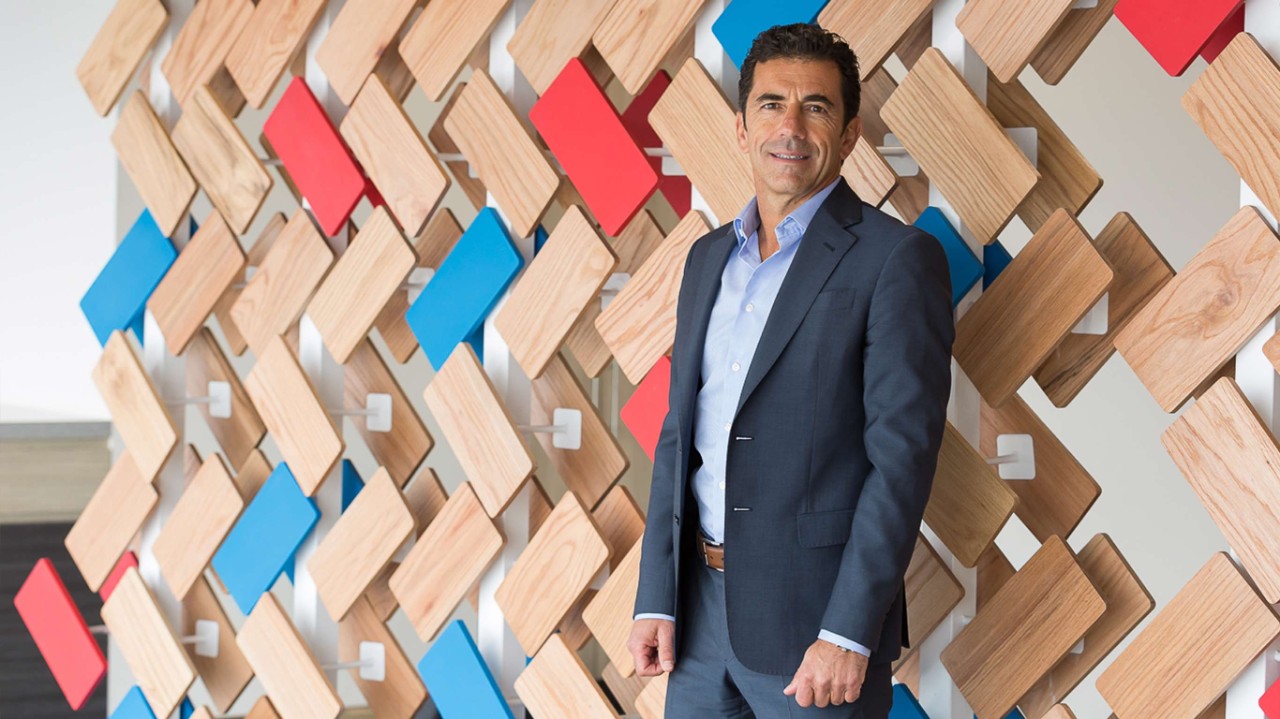
The brothers had made their pitch. From across the table, an executive for the international operations of Domino’s Pizza looked them up and down. While barely twenty-four years old, Cosme and Alberto Torrado already had impressive experience of running businesses. And although they had never worked in the restaurant trade, their hunger and energy were palpable. Their proposal on that day, however, seemed a little too ambitious.
With a polite smile, the executive gently informed the brothers that Domino’s was not able to grant them the master franchise for the whole of Mexico. The young men exchanged a disappointed glance.
But their interviewer wasn’t quite finished. He then explained that the company’s Mexican rollout was occurring piecemeal and that they could trial a batch of ten stores if they wanted.
While it wasn’t entirely what they’d hoped for, the brothers readily accepted. And on June 2, 1990, their first Domino’s restaurant opened for business in the San Ángel neighborhood in the south of Mexico City. As the staff unlocked the doors for the first time, they were greeted by a line of people that stretched around the block. Many customers had traveled from far and wide for the experience.
Cosme and Alberto knew they were on to a good thing. Foreign fast food was still something of an exotic novelty in their native land. Prior to the relaxation of longstanding trade restrictions a couple of years earlier, the big international chains had been excluded from Mexico altogether.
“Originally, we had hoped to win a franchise for a certain global burger chain,” recalls Alberto. “But the price was out of our reach. We looked around for a brand that would require less capital investment and landed on Domino’s. The simplicity of the business was beautiful. Within thirty minutes, you’ve taken the order, made the pizza, delivered it and the money is in your pocket.”
Helping to make a success of their first store was their youngest brother Armando. Still only seventeen, Armando worked the shop floor, taking orders over the phone, preparing pizzas and getting them to customers. Very soon, he found himself with a store manager’s responsibilities, including opening and closing for the day.
“I remember it was all go, especially on weekends when there was a major soccer game on TV or if we were running a promotion,” says Armando. “I was proud to be doing hands-on work in the business we’d just started. In this industry, it’s all about leading by example. That’s how you get the best results from your people.”
Three months after opening their first store, Cosme and Alberto sat down to review their progress. In that short time, they had already made back their entire initial investment.
“We’re definitely in the right business here!” Cosme exclaimed. “This is what we need to be doing. We should give this our complete focus.”

Until then, the two older brothers had both also been involved in other enterprises. Cosme was running a tire company while Alberto was overseeing a chandelier factory that he had purchased from their father – see Cosme, Alberto and Armando Torrado: Our lives. Now, though, the path ahead was clear. Not long afterwards, the brothers discovered that Domino’s was rethinking its strategy.
“Domino’s could see the growth potential in Mexico,” says Alberto. “But they also realized that their approach of granting only a few franchises at a time was going to make it hard for them to reach critical mass. With little international experience beyond Canada, they then decided they should do a master franchise agreement for our country, just as we had originally proposed six months earlier.”
Cosme and Alberto sprang into action. Using purchased market research, they modeled a national rollout across Mexico’s many populous areas alongside the projected cash flows. However, they faced competition from two other local franchisees that had been in business slightly longer. At home one Sunday, Alberto got a call from Domino’s international chief, requesting a meeting the next day. This time, however, the franchisor would be flying from Michigan into Mexico City, rather than vice versa.
“Looking back, our pitch was pretty rudimentary,” reflects Cosme. “Our projections clearly got their attention, though. They probed us as to whether Mexico could really sustain as many stores over the next few years as we were saying. Obviously, we wanted to finalize the deal as soon as possible. We offered them $5m to become the master franchisee for our country.”
To the brothers’ delight, the Domino’s representative responded favorably. However, he also indicated that he’d need to take a deposit from them. Cosme and Alberto asked if they could have five minutes alone to confer.
“Our main thought was, ‘what are we going to do?’” recalls Alberto with a smile. “At that moment, we really didn’t have a fraction of the funds needed for a downpayment. So, we wrote out a check for $250,000 and handed it over, pleading with the executive not to cash it for at least a week. We then immediately approached a business contact of our father’s and managed to convince him to lend us the money.”
The next task was to deliver on the mouthwatering growth they had extrapolated in their presentation to Domino’s. The brothers decided that sub-franchises were the way to go, initially granting around twenty for each of Mexico’s thirty-two states. To support this scaling up, they put in place a network of distribution and support centers and established a marketing operation.
A familiar pattern emerged. A local newspaper ad would herald the latest store, with long lines of customers forming on opening day. Mexico’s appetite for Domino’s pizza was outstripping the brothers’ ability to meet demand. Taking their rollout ambitions to the next level would require significant additional capital. An initial public offering beckoned.
“As we looked to go public, we realized we needed to tell a long-term growth story,” says Cosme. “That’s what stock analysts and investors want to hear. A year before we went public in 1999, we decided to enter Brazil. It’s the biggest market in Latin America, after all. We thought it would offer the growth story that we needed.”
The experience, however, was an unhappy one. Having won the master franchise for Brazil, the company’s twenty or so stores did not perform well. It then sought out a local partner, but this arrangement also foundered.
“Brazil was a real mistake. We didn’t know the country or do our homework properly,” Alberto admits. “Our business model there wasn’t efficient and local competition was already intense, especially from restaurants in the informal economy. Operating in Brazil is complicated, with labor rules and other regulations differing across the country’s various states. After about five years, we sold up for a loss and left. But we had learned valuable lessons.”
Ours is the ultimate hands-on business. When you go to a well-run store, you always see a manager who leads by example, multi-tasking, getting involved with everything.
Elsewhere, however, Alsea – as the now publicly traded company was known – was enjoying rather more success. In 2002, it acquired the license to operate Starbucks coffeehouses and Burger King in Mexico. Four years later, the company acquired Burger King’s operations in Chile and Argentina, where it subsequently began rolling out Starbucks. Alsea also added other brands to its stable, including Chili’s, Italianni’s, P.F. Chang’s and The Cheesecake Factory.
“We were opening a hundred stores a year in Mexico and across the wider region,” says Armando, who now serves as chief executive officer of Alsea. “Obviously, we didn’t see equal growth rates across each country. But the rollout was fairly straightforward, as with a franchise model you apply the same product, vendors and suppliers. Copy, paste, copy, paste.”
Today, Alsea has some 4,500 outlets and employs almost 80,000 people. In 2012, the company raised eyebrows by expanding into continental Europe, far from its home region and at that time mired in an economic funk. Among the fourteen nations where it is present today are Spain, Portugal, Belgium, the Netherlands and France. Recently, it has opened the first ever Starbucks in Paraguay.
Starting with their very first units over three decades ago, the brothers learned the critical importance of people to their success. In particular, this means having effective and motivated managers at store level.
“Ours is the ultimate hands-on business,” says Armando. “When you go to a well-run store, you always see a manager who leads by example, multi-tasking, getting involved with everything. One moment, they’re greeting customers, and the next, they’re taking a pizza to a table, pouring coffee or taking away dishes to be washed.”
“The people working our stores are heroes,” says Alberto. “While everyone else is watching the soccer finals or celebrating the holidays at home, these guys are working. And they’re passionate about it. I’ve got people who’ve been in kitchens for forty years and they love it. I prefer the term ‘partners’ to ‘employees’. We’re all the same at this company; we just have different jobs.”

We’ve always had open doors in this company. We want our people to talk to us as equals.
“We’ve always had open doors in this company,” reflects Cosme. “We want our people to talk to us as equals. So, we asked everyone to call us ‘tú,’ the familiar form of ‘you’ in Spanish. When we go into the stores, we want our people to approach us and have a conversation. They genuinely appreciate this.”
The dynamics between the brothers has also been crucial over the years. Equality has been a defining feature of their relationship since the outset. This partly stems from the influence of their late father, who sold his early shareholding in the then-private company at a discount price to Armando. His aim was to ensure the youngest of his sons entered the business on the same footing as the elder two.
This egalitarian spirit has remained throughout. The brothers agree to divide their collective salaries equally, even if their paychecks differ according to the role. They’ve also resolved to respect whatever the majority view is between them.
“We’re very different characters, but we’ve managed to maintain a beautiful relationship, free of rivalry,” observes Alberto. “Cosme – who now runs our family office – is a details guy who reflects and analyzes. Armando loves to travel, meet people and see the action on the ground. And I’ve always been thinking about what’s next, providing the drive behind our acquisitions. I believe we’ve always struck a perfect balance between family and business within the company.”
Cosme, Alberto and Armando: Our lives
“We were born and raised in Mexico City,” says Cosme Torrado. “We were raised in a Catholic culture and received a great education at school that also taught us solid values. As the eldest, I thoroughly enjoyed my early life, both at school and at home as a family. Our father was an entrepreneur, and our mother had her hands full raising three often very rowdy boys! She was qualified as a teacher but didn’t go into teaching. She did, however, play a very active role in helping us learn and do our homework.”
“Our family wasn’t wealthy to begin with, but life steadily improved as our father became more successful in business,” recalls Alberto. “We lived in a nice house with a pool in a neighborhood called Lindavista. After finishing our homework, we’d go outside to ride bikes or skateboard. There was a man who would pass through the area with horses that you could hire to ride around the block. That was my weekly treat. At school, I loved playing soccer and American football.”
“Our father had started out as a lawyer working for the state judiciary,” he continues. “While still in post, he started a side hustle running a taxi firm. He expanded into operating buses in central Mexico and then into car dealerships.
He also developed some buildings as an investment. So, he jumped around a lot, always aiming to improve things for his family. From day one, he took us to see his work. When I turned sixteen, he asked me to take care of selling his fleet of a dozen taxis. At nineteen, Cosme and I ended up running the car body shop he owned.”
“Education combined with work was what our father encouraged,” Cosme reflects. “He supported me to go to college right up to MBA level. But at the same time, he wanted us to be involved in his businesses. I started working for him when I was sixteen. He put me in charge of a wallpaper factory that he owned. He told me that if I did a good job, he’d share the gains with me. That was always his message to us: ‘if you make my assets more valuable, I’ll cut you in.’”

Be transparent, honest and devoted to your profession as if it were your spouse.
“I started running a small chandelier factory when I was still in high school,” says Armando. “I was sent in to troubleshoot and I identified the problem as an absentee manager, whom I let go. My father told me that I would now have to take over as manager myself. In between my studies, I would see to paying the twenty-plus employees, coordinating sales and finding new designs. I ended up buying the factory from my father and his business partner and selling it on when I came to invest in Domino’s.”
“Our father taught us the philosophy of work,” says Armando. “Be transparent, honest and devoted to your profession as if it were your spouse. I began working part-time from the age of fifteen. Having an income when you’re young gives you an important sense of independence. I don’t agree with stacking up endless qualifications throughout your twenties without combining it with paid work. I am grateful to my father for raising us the way he did.”
“Between us, we have twelve children, so we have a big ‘bench,’” says Cosme. “Aside from giving them a good education and values, we have ensured they had exposure to the business. My kids came with me on Saturdays to see how things are done. So, they know all about pizzas and coffee! But they need to make their own choices. Only my son and Alberto’s son are currently with the business. My son started from the bottom, training with The Cheesecake Factory. He gave up his university studies to focus on our company. He aspires to a leadership role, so let’s see if he makes it.”
“My brothers and I have not built a company for our next generation to work in,” says Armando. “Alsea is a public company, of which our family owns a significant stake. That said, there is room for family members. But the deal is that they get treated like any other employee and earn positions by rising through the ranks. And we hope that the next generation will continue our family involvement through the boards, even if they’re not running it.”
“Operating in many countries has enabled me to experience many different cultures,” says Alberto. “Human needs are similar everywhere. Politicians can’t solve all society’s problems; business leaders are among those who need to play their part. Collectively, we as business leaders have not done enough so far. In Mexico, we have extreme inequality, with tens of millions living in poverty. Such disparities of wealth aren’t ultimately sustainable. As a global citizen, I feel a responsibility to enhance the lives of others.”
“It’s a privilege to serve customers and create jobs across thirteen countries,” says Armando. “Doing business in other places is great because it requires you to adapt and learn. Versatility is a terrific strength. Sustainability is also vital to us as a company. We strive to pay above the minimum wage. Our philosophy is based upon improving the lives of our colleagues around the world.”







